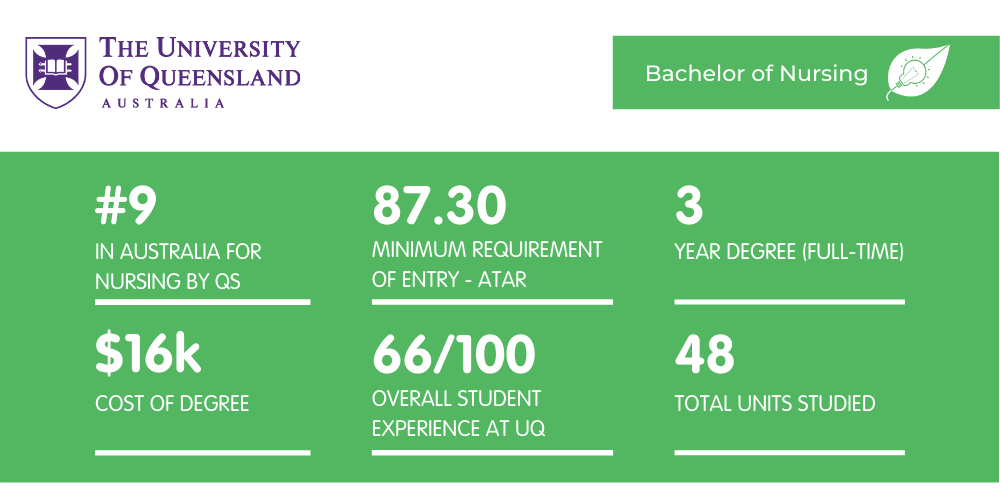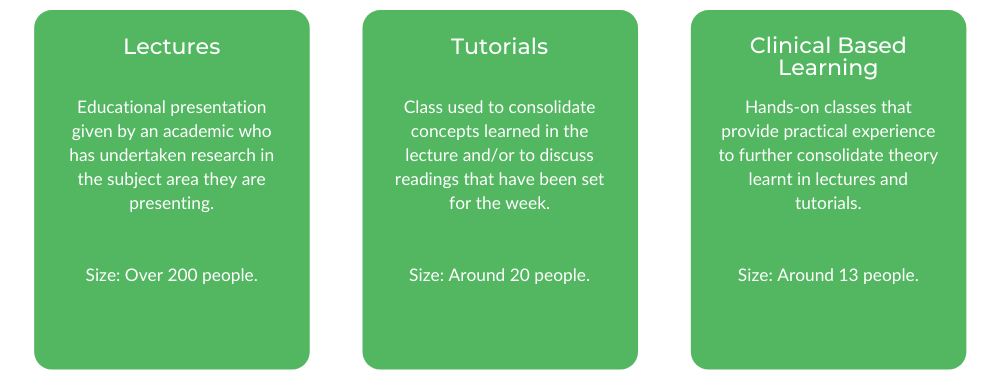Are you passionate about healthcare and looking to make a real difference in the lives of others? A Bachelor of Nursing at UQ might be the degree for you!
In this article, we’ll be unpacking everything you need to know including entry requirements, course structure, teaching format, and faculty and culture.
Let’s get started!
What is a Bachelor of Nursing at UQ?
Core Units for this Degree
How to Get into a Bachelor of Nursing at UQ
What’s the Teaching Format?
What’s the Faculty and Culture Like?
What is a Bachelor of Nursing at UQ?
A Bachelor of Nursing at UQ is basically your one-stop-shop for learning everything you need to become a fully registered nurse. You’ll not only cover the theoretical component but also get hands-on experience right from the start with over 1000 hours of clinical placements.
We talked to Samara Ebzery, a third year Nursing and Midwifery student, who started her placement as early as week 6 during her first year! Your final year of study will help you transition towards registered nursing with full-time clinical placements to consolidate your knowledge and skills.
Can this degree be studied in conjunction with another?
You can also study Nursing at UQ as a dual degree with a Bachelor of Midwifery which can help you build your skillset and maximise your professional opportunities.
Find out more about the dual Bachelor of Nursing and Midwifery degree here!
Honours
The degree also offers a 1-year Honours program where you will plan and conduct research to complete a thesis that addresses a particular scientific question.
The coursework requires you to discuss and collaborate closely with peers and teachers. Your thesis is publishable and might even be a major research contribution to the field!
To be eligible for the Honours program, you need to complete a Bachelor of Nursing at UQ with a GPA of 5 or a similar qualification. Check out all the requirements, coursework and benefits of a Honours program here!
Career Paths
Studying a Bachelor of Nursing at UQ can lead to a wide range of careers within the healthcare and nursing industry.
Some of the career opportunities with this degree include:
-
- Registered nurse
- Aged care
- Community health
- Critical care and emergency
- Child and family health
- Disability and rehabilitation
Core Units for this Degree
The Bachelor of Nursing at UQ has 48 units in total with a lot of core units from various fields including biomedicine, health and nursing.
One of the core units you’ll study in your first year is Health Across the Lifespan. This unit looks at psychological concepts of health, wellness and illness in relation to various stages of the human lifespan. You will also learn about how lifespan differs based on cultural and biological factors and the appropriate communication strategies you need to provide nursing care across the lifespan.
Another core unit is Professions, People and Healthcare. This unit focusses on Australia’s healthcare system in a global context and looks at various people-centred healthcare practices and services.
Other core units for this degree include:
Are there built-in work placements?
A Bachelor of Nursing at UQ integrates clinical practices along the way, which means you’ll be getting hands-on experience from your very first semester!
Clinical placements are supervised practices that allow you to consolidate the theoretical content you’ve studied and develop your practical skills for future careers. These practices are a pretty big component of your degree and will usually take up around 16 hours per week.
Placement can be undertaken in a wide range of clinical settings and areas such as:
-
- Hospitals
- Critical Care
- Emergency Medicine
- Paediatrics
- Aged Care
- Rural
- Mental Health
You might even have the opportunity to undertake a clinical placement outside the Brisbane metropolitan area or overseas.
The university will typically place you in particular clinical settings such as aged care, mental health and hospitals which helps you explore different career paths within nursing and healthcare.
Once you’ve had a chance to look at the different opportunities available to you, there’s a preferential system during your final year of study which allows you to select preferences for placements. Depending on their popularity, some options may be quite competitive!
How to Get into a Bachelor of Nursing at UQ
While the ATAR/selection rank cut-off for this degree is 87.30, there are alternate pathways to help you get into this degree.
UQ offers various bridging or pathway programs that might increase your selection rank and/or help you meet the subject prerequisites for your degree. Similarly, there are numerous admission schemes to provide you with up to 5 adjustments to your selection rank based on your background and circumstances, where you live and the subjects you’re studying for Year 12.
Check out more info about alternate pathways to a Bachelor of Nursing at UQ here!
Are there any prerequisites?
Subject prerequisites for this degree include studying either Physics, Chemistry or Biology.
What scholarships are available?
While there aren’t any scholarships for a Bachelor of Nursing in particular, there are heaps of scholarships available at the University of Queensland including academic, equity and sporting scholarships. It’s important to check your eligibility for scholarships but you might be surprised at how many opportunities there are!
So, definitely find out more and apply for one here!
What’s the Teaching Format?
A Bachelor of Nursing at UQ is taught through semesters and combines various learning activities including lectures, tutorials and clinical based learning (CBL).
Class Structure
Lectures
With all your subjects combined, you’ll have around 5 lectures every week which are around 1-2 hours in length (it varies depending on the subject).
Lectures cover weekly content relevant to the subject including key concepts and theories. These will usually be online with over 200 students attending.
Tutorials
Tutorials are more interactive learning activities and will require you to discuss with your peers to consolidate what has been covered during the lecture.
While tutorials are supported by tutors, it’s mostly about networking and collaborating with fellow students. These are much smaller than lectures and are typically attended by 20 students.
Clinical Based Learning
CBL sessions are hands-on and aim to provide some practical experience to further consolidate the theory you’ve studied through lectures and tutorials. You will undertake your CBL sessions in a fake hospital ward set up where you can practice a range of clinical skills required to provide care in clinical settings.
These sessions are compulsory to ensure that you’re practising and developing your clinical skills and receiving feedback from lecturers and your peers. Because of their practical component, CBL sessions are quite small with only around 13 students so that the lecturer can give each student enough time, attention and feedback.
How many hours do you go to university?
If you’re studying a Bachelor of Nursing at UQ full-time, you’ll be studying 4 units per semester. Most tutorials, lectures and clinical based learning sessions will be around 1-2 hours long which gives you around 20 contact hours a week (this will vary depending on your subjects).
But there’s also independent study to be done on top of approximately 16 hours of clinical placements a week!
What are the assessments like?
While you will have a lot of practical and hands-on components, Nursing assessments are quite diverse and differ from subject to subject.
Theory-Based
For subjects covering science and theory related to biomedicine, healthcare and nursing, you might have a range of assessments such as online quizzes, reports, reflections and group work which are often worth around 5-30%. There are also major essays and end-of-semester exams which are worth a lot more, even up to 50-60%!
Practical
Some units will also have practical assessments to test your clinical skills. These will usually include simulations and fake scenarios during your Clinical Based Learning sessions. Other practical components may include peer assessments during CBLs which are ongoing throughout the semester to ensure you have successfully developed particular clinical skills.
The other major practical assessment is your clinical placement, which is assessed as a non-graded pass. This means that in order to be eligible to pass the subject, you have to complete all assessment components and demonstrate adequate competence when applying your nursing knowledge to clinical settings.
What skills will you refine and learn?
With all the hands-on experience you’ll receive from your placements, you will obviously learn the clinical skills required in various nursing careers and real-world scenarios. You’re also developing your communications skills to not only communicate with patients but also to communicate with fellow staff members and doctors in complex, high-pressure situations.
Beyond the practical clinical skills you develop, you’re also going to refine your confidence and resilience as things don’t always go as planned and you develop a thick skin in response to the challenging and often confronting nature of healthcare and nursing.
Empathy and compassion are probably qualities and skills you already have if you’re interested in a nursing degree, but studying Nursing at UQ will further refine them as you come across diverse patients and very rewarding experiences.
What’s the Faculty and Culture Like?
Studying a Bachelor of Nursing means you’re likely to be surrounded by like-minded people who are invested in caring about others and making a difference. With all the core units in this degree, you’ll find yourself seeing some familiar faces throughout your degree and you will be making lifelong friends within this supportive and caring environment!
Since the experiences you go through can be confronting and scary at times, your support system will help you maintain a positive and warm environment.
This environment is also created through the UQ Nursing and Midwifery Association (UQ NAMSA) with a range of activities and opportunities including fun scrub crawls, balls and professional development events.
The University of Queensland also has a variety of other clubs and societies such as Debating, Karaoke, Football, Photography and everything in between.
Faculty
While studying a Bachelor of Nursing at UQ, you’re being taught by passionate lecturers who are not only knowledgeable researchers and teachers but also experienced professionals within the nursing field. This means many of your lecturers have been in very similar situations to you!
The staff and faculty are really approachable and willing to support you during and beyond your classes.
Mentoring
During your degree, you will also have the opportunity to receive support through mentoring programs. The UQ Career Mentoring Program for the Faculty of Health and Behavioural Sciences is available to students in their final year.
The program will put you in contact with a mentor who is an experienced professional within the industry you’re interested in. This mentoring aims to support your academic learning by providing a more holistic perspective regarding career options, goal setting and transitioning towards full time nursing and healthcare.
Having the opportunity to connect with an industry professional and receive mentoring from them is a great way to find career direction and develop professional skills alongside your academic learning.
Maitreyi Kulkarni is a Content Writer at Art of Smart Education and is currently studying a Bachelor of Media and Communications (Public Relations and Social Media) at Macquarie University. She loves writing just about anything from articles to poetry, and has also had one of her articles published with the ABC. When she’s not writing up a storm, she can be found reading, bingeing sitcoms, or playing the guitar.






